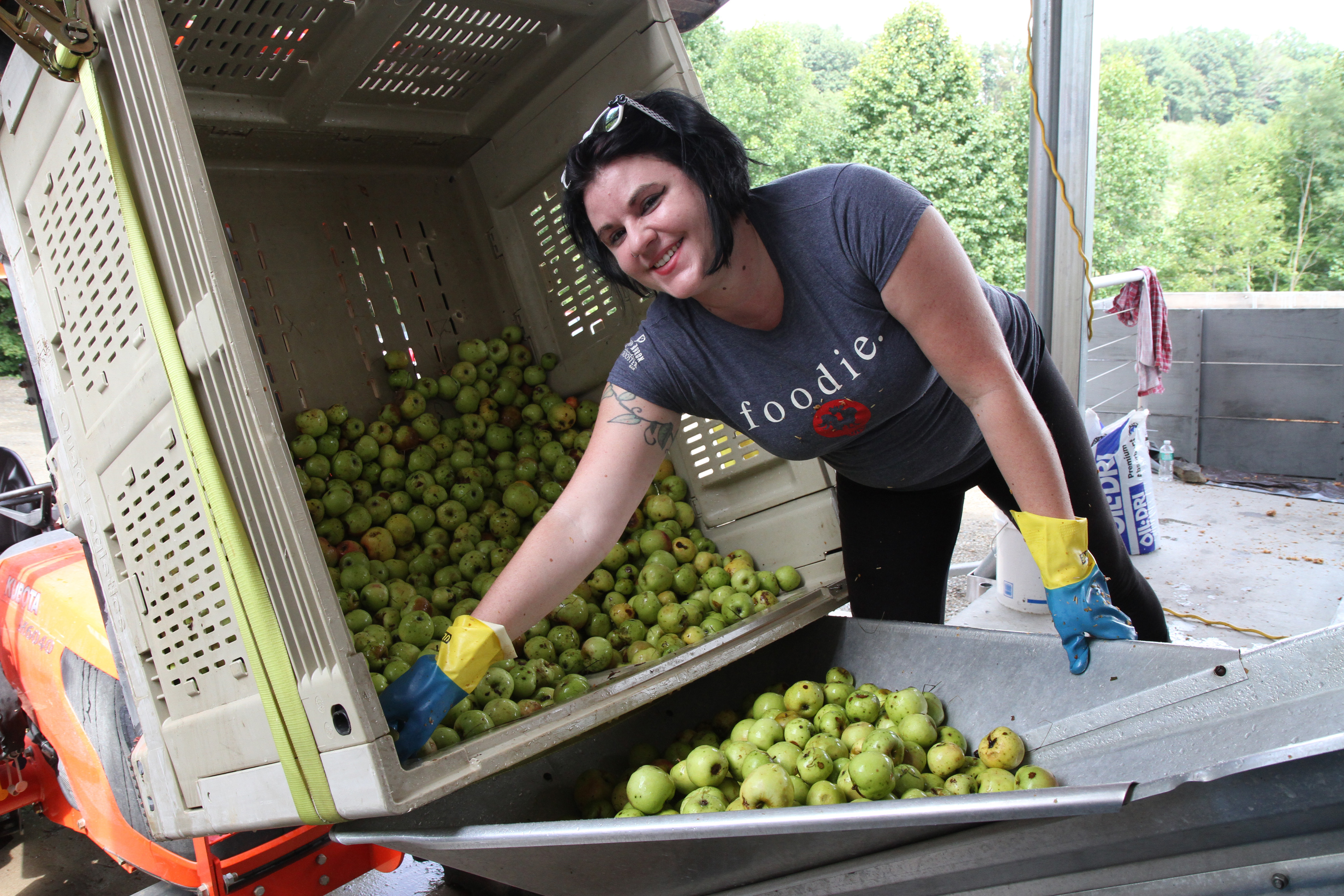Student researcher studies the core of cider production

It’s been said that the apple doesn’t fall far from the tree. But one Virginia Tech student researcher is interested in a different phenomenon: how many apples fall from the tree, and how does this affect cider quality?
Meg McGuire of Dublin, Virginia, a senior majoring in food science in the College of Agriculture and Life Sciences, is interested in how the crop yield of apple trees affects the apple quality and ultimately, cider quality.
Over the past 10 years, entrepreneurial cider-making has enjoyed a boom in Virginia with more than 10 licensed commercial cideries in operation. This industry is expected to continue to boost Virginia’s economy for a long time to come.
Wine production is also popular in the region, but McGuire believes that cider making could equal or even bypass that industry, noting that in many areas of the state, climate and soil are much more conducive to apple growing than grape growing.
McGuire works with two College of Agriculture and Life Sciences faculty, Amanda Stewart, an assistant professor of food science and technology and Fralin Life Science Institute affiliate, and Greg Peck, an assistant professor of horticulture, to better understand the optimal orchard management practices for hard cider production.
Her goal is to see how much yield -- the number of apples grown on an individual tree -- can increase before negatively impacting cider quality. Her goal is to help apple growers produce fruit that has a balance of tannins and acids to create a crisp, tart, and refreshing cider.
McGuire’s field research occurs at the Alson H. Smith Jr. Agricultural Research and Extension Center in Winchester, Virginia, which is the facility where Peck’s pomology research program is based. In October, she visited the center to harvest this year’s crop.
Apple trees naturally have a biennial bearing habit, meaning that high crop yield years are followed by low yield years.
“There is only so much rainfall and available nutrients in the soil,” McGuire said. “In trees with higher crop loads, the nutrients and water are partitioned more sparsely than in trees with lower crop loads. Crop load certainly plays a factor in affecting apple quality. We are trying to figure out exactly how this translates to cider quality.”
McGuire’s work was funded by a $10,000 grant from the Virginia Department of Agriculture and Consumer Services. Future projects will be funded through a $43,360 grant through the U.S. Department of Agriculture, administered through the Virginia Department of Agriculture and Consumer Services, as well as an additional $49,498 planning grant through the U.S. Department of Agriculture. That grant will bring researchers from Virginia Tech, Cornell University, Washington State University, Michigan State University and the University of Vermont together to look at creating interdisciplinary extension and research programs to redevelop the North American hard cider industry.
In addition to her lab research, McGuire receives firsthand experience in hard cider production as a part-time employee at Foggy Ridge Cidery located in Dugspur, Virginia. The cidery grows more than 20 heirloom varieties on an on-site orchard, including Roxbury Russet, Hewes Crab, and Kingston Black varieties.
"At Foggy Ridge, we grow and press apples that are picked according to flavor and their suitability for making hard cider,” said Jocelyn Kuzelka, cidermaker at Foggy Ridge Cidery. “We are located in a region that has an amazing bounty of heirloom apples that are excellent for making delicious hard cider, so we blend both the apples and dry ciders to capture the diverse aromas and flavors of those apples. In the cider house, we aim to produce flavorful, complex ciders that are balanced, crisp, and quaffable."
McGuire helps process the apples, which involves washing, milling, and pressing to remove juice, which is then fermented on-site to make hard cider.
“We are leveraging Virginia Tech’s expertise in horticulture, food science and technology, and agricultural and applied economics to develop research-based resources for the rapidly expanding cider industry in Virginia and North America,” Stewart said. “We are excited that undergraduate students like Meg are finding opportunities to contribute to the land grant mission through our research and extension programs.”
Dedicated to its motto, Ut Prosim (That I May Serve), Virginia Tech takes a hands-on, engaging approach to education, preparing scholars to be leaders in their fields and communities. As the commonwealth’s most comprehensive university and its leading research institution, Virginia Tech offers 240 undergraduate and graduate degree programs to more than 31,000 students and manages a research portfolio of $513 million. The university fulfills its land-grant mission of transforming knowledge to practice through technological leadership and by fueling economic growth and job creation locally, regionally, and across Virginia.








